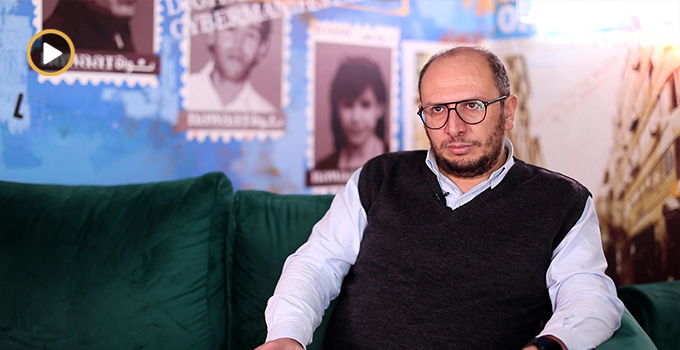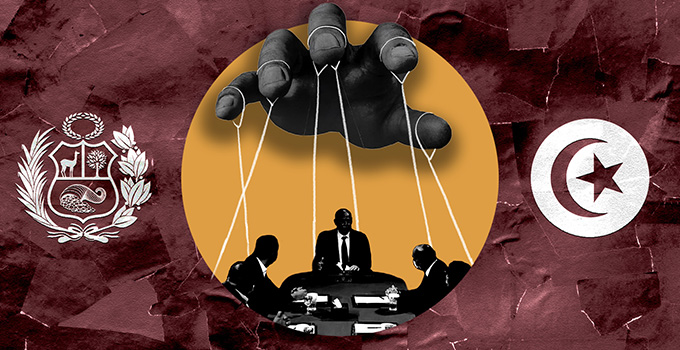
Political Exclusion1 after the Revolution
Several articles by Nawaat contributors Khawla Euchi and Samih Ben Okkez constitute a reflection on the past three years through the present political, social, and economic atmosphere in anticipation of legislative elections and presidential on 26 October and 23 November respectively. Read together, Euchi’s The Disappointment of the Revolution and Okkez’s three-part Nostalgia for Ben Ali prompt readers to consider the implications of electing former members of the Ben Ali regime for the country’s first elected government after democratic transition. Recognizing the instatement of authorities of the former regime as a sign of regression to the corruption that was the source of discontentment and revolts in 2008 and 2010, the authors enumerate people and practices that maligned state institutions and bated the citizenry’s well-being throughout the twenty-three-year reign of former President Ben Ali.
The following is an overview of Euchi’s recent article which examines how former members of the ruling party have navigated attempts to codify political exclusion and re-entered the political scene as the country prepares for the elections that mark the end of the designated democratic transition period.
Article 15 – 2011 Parliamentary Elections
On 9 March 2011, Tunisians celebrated a court order to try Rassemblement Constitutionnel Démocratique (RCD) officials for corruption. The majority of the ministers and security officials tried were pronounced innocent and released from prison. In the wake of uprisings in which demonstrators demanded freedom, dignity, and equality, the process of transitional justice2 that encompasses reconciliation and accountability appears to have been subverted by political party interests that have transcended the will to exclude the «symbols» of past corruption from present politics. Early attempts by Ennahda, CPR, and Wafa deputies to pass an immunization law under which former RCD members would be excluded from the political arena were met by resistance from the 87-year old member of the deposed government Beji Caid Essebsi who qualified the proposed measure as undemocratic. The result was the adoption of a revised version of Article 15. Whereas the original draft was designed to exclude all former members of the Ben Ali administration from participating in the 23 October 2011 parliamentary elections, the final text prohibited only those directly affiliated with the RCD party:
Any person has the right to run for the National Constituent Assembly who:
– is a voter;
– is at least 23 years of age at the time of declaring his candidacy.Ineligible for candidacy:- any person who has held a position within the government of the deposed president, except members who did not belong to the Rassemblement Constitutionnel Démocratique, and any person who held a position within the Rassemblement Consitutionnel Démocratique during the time of the deposed president.
The concerned persons will be determined by decree by the High Authority for the Realization of the Objectives of the Revolution, Political Reform, and Democratic Transition.
– any person who called for the deposed president to run as candidate for a new term in 2014. A list will be issued for this purpose by the High Authority for the Realization of the Objectives of the Revolution, Political Reform, and Democratic Transition.
Article 15 of Chapter II, Section 1, Decree-law n° 2011-35 of 10 May 2011 concerning the election of a National Constituent Assembly. Translated from the French version available by the Geneva Center for the Democratic Control of Armed Forces, DCAF.
As the electoral code was being teased out and during the months that Essebsi headed the government as Prime Minister (27 February – 24 December 2011), dozens of permits were issued to former RCD members to establish political parties. Essebsi’s own party, Nidaa Tounes, was launched shortly after his term in the interim government and gained official status on 6 July 2012.
Article 167 – 2014 Parliamentary Elections
The second significant legal debate on political exclusion centered around Article 167 of the electoral code for the 2014 legislative elections.
No person may run in the parliamentary elections who occupied a government position during the time of the deposed president, except for those who were not members of the Rassemblement Constitutionnel Démocratique.
No person may run who held a position within the Rassemblement Démocratique National that was dissolved under Decree n°1089-2011 of 3 August 2011.
Translated from the French version available on the Marsad website
Never in Tunisia’s modern history has an article of law been so controversial, provoking so much polarization, so many verbal spars and politico-ideological clashes, than this one which has become famously known as the ‘law of exclusion,’ pertaining to the former deputies of State and [Ben Ali Regime]. Imed Bahri, Rejection of Article 167 and the New Destourian Order
For many Tunisians, the controversy provoked by Article 167 was yet another indication that post-revolution politics have been propelled by the whims of electoral rivals as opposed to the relatively universal ideals and objectives of transitional justice. With elections on the horizon, Ennahda and Nidaa Tounes were once again seen at the center of debate, not, as it turns out, so much in the National Dialogue as in the purportedly surreptitious negotiations epitomized by the Paris meeting in August 2013 when Essebsi convened, unannounced and unofficially, with Ennahda leader Rachid Ghannouchi abroad.
The suspenseful denouement of the Article 167 debate was a tense day in parliament chambers when Ennahda literally changed its vote at the last moment. Having initially pushed for a sweeping measure on the «immunization of the revolution», Ennahda, and Ghannouchi in particular, have since argued against political exclusion, a curious change of heart that is indicative of the party’s internal divisiveness and is attributed to opaque party relations and negotiations.
It’s a political class, more concerned with the prospect of future elections than with transitional justice, that has just finalized, and hastily so, an important step of the transition. In rejecting, by the smallest margin, the principle of political exclusion barely three years after the revolution, the (National Constituent) Assembly compromises the democratic nature of the transition owing to an elusive agreement between Ennahda and Nidaa Tounes. Seif Soudani, Transition Derailed.
What Euchi demonstrates in The Disappointment of the Revolution is the falling short of an effective transitional justice process, a degredation of standards since 2011 that has witnessed the successive criminalization of former regime officials to their pardoning, to the concession of their right to engage in politics. Those who were initially seen as “enemies” of the state have gradually come to be recognized as political equals, now rivals now allies as per the momentary needs of political parties vying for electoral ground. According to Euchi, these long-standing political actors have succeeded in rebuilding their presence in the political sphere and in the media over the past three years, benefitting from the fading of public resentement as Tunisians have turned their attention to cope with imminent economic and security issues. It has in fact become characteristic of reformed “destourian” party pre-election discourse to point to the present economic crisis and increased incidence of terrorism as indications of a deterioration of previous qualities such as affordability of basic goods and “security” that citizens enjoyed during the Ben Ali era (such discourse is dissected and examined in-depth in Okkez’s Nostalgia for Ben Ali mentioned above).
Finally Euchi presents an (incomprehensive) list of names and descriptions of former RCD members whose presence in newspapers, on radio and television programs, on websites and social media networks–often seen as explicit attempts to cleanse their reputations of corruption3–is for many an unnerving reminder of the ills that plagued Tunisia’s political body, and by extension society and the public welfare, over the past two decades of dictatorship.
| Name | Position(s) Held in the Ben Ali Government | Current Political Activities/Affiliation |
|---|---|---|
| Beji Caid Essebsi | Parliamentary President (1991-1992) | Presidential candidate, Founder of Nidaa Tounes |
| Mohamed Ghariani | RCD Secretary General | Nidaa Tounes |
| Kamel Morjane | Minister of Defense, Minister of Foreign Affairs | Presidential candidate, Founder of Al Moubadara |
| Mohamed Jegham | Minister of Tourism, Minister of the Interior, Minister of Defense, Ambassador to Rome | Founder of Al-Watan, Deputy Chairman of Al Moubadara |
| Hamed Karoui | Prime Minister, Minister of Justice | President of the Destourian Movement |
| Abderrahim Zouari | RCD Secretary General, Positions in the Ministry of Justice, Ministry of Youth and Childhood, Ministry of Foreign Affairs, Ministry of Tourism, Ministry of Transportation | Presidential Candidate, Destourian Movement |
| Mondher Zenaidi | Ministry of Transportation, Ministry of Commerce, Ministry of Tourism, Ministry of Health | Presidential candidate |
Having surpassed all of these legal and political challenges, what remains for former RCD officials is to return to their political activities, to gather adherents, to knock on the doors of foreign embassies for financial and political support in order to reassume their previous positions in parliament and government.» Khawla Euchi, The Disappointment of the Revolution: RCDists Participate in the Upcoming Elections with Confidence in Victory
Notes
1- Read Riadh Guerfali’s When Abdessalem Jrad Shamelessly Praised Ben Ali for context of, insight into, and a discussion on political exclusion in Tunisia.
2- See Transitional Justice in Tunisia, Lessons and Perspectives by Monia Ben Jemia published on Al Huffington Post Maghreb on 2 June 2014.
3- A fascinating example is the official website of Abdallah Kallel, who meticulously lays out his political background, the conditions of his arrest, and the «Truths and Lies» associated with his work within the Ben Ali administration.




